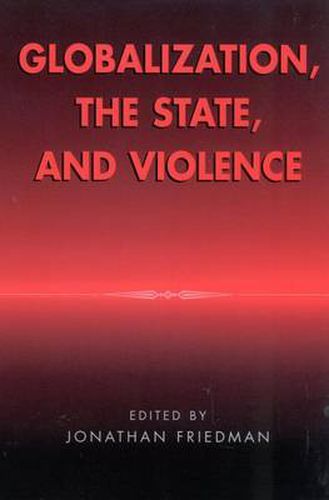Readings Newsletter
Become a Readings Member to make your shopping experience even easier.
Sign in or sign up for free!
You’re not far away from qualifying for FREE standard shipping within Australia
You’ve qualified for FREE standard shipping within Australia
The cart is loading…






An analysis of globalization and the global structuring of violence. In particular, the contributors investigate the complex processes of cultural fragmentation and of the formation of transnational networks: economic, social and cultural. In a critical introductory essay, Jonathan Friedman evaluates how transnational capital represents a truly global force, but geographical decentralization of accumulation still leads to declining hegemony in some areas and increasing hegemony in others. The contributors examine indigenous populations which have become increasingly organized and victorious in battles over land and cultural autonomy. Migration processes are analyzed as massively destabilizing phenomena in the world, in which ethnification of such groups has led to fragmentation of former national unity, resulting in new transnational identities, cultures and social existences. The authors describe the rapid increase in criminalization of ethnic and immigrant groups as well as an increase in class stratification, creating new forms of social fragmentation, confrontation and violence. In addition to ethnic, identity-based conflict there are analyses of the violence related to the formation of transnational criminal networks, which also represents disintegration of larger territorial homogeneities and/or hierarchical orders. In his chapter, Michel Wieviorka refers to this as a new paradigm of violence, one in which broad ideological struggles are increasingly replaced by local identity struggles or simply fragmented interests of an economic or political nature. The volume should be useful to instructors in anthropology, social and cultural theory, international politics and economics, ethnic conflict, immigration, economic history, stratification and inequality, and social organizations.
$9.00 standard shipping within Australia
FREE standard shipping within Australia for orders over $100.00
Express & International shipping calculated at checkout
An analysis of globalization and the global structuring of violence. In particular, the contributors investigate the complex processes of cultural fragmentation and of the formation of transnational networks: economic, social and cultural. In a critical introductory essay, Jonathan Friedman evaluates how transnational capital represents a truly global force, but geographical decentralization of accumulation still leads to declining hegemony in some areas and increasing hegemony in others. The contributors examine indigenous populations which have become increasingly organized and victorious in battles over land and cultural autonomy. Migration processes are analyzed as massively destabilizing phenomena in the world, in which ethnification of such groups has led to fragmentation of former national unity, resulting in new transnational identities, cultures and social existences. The authors describe the rapid increase in criminalization of ethnic and immigrant groups as well as an increase in class stratification, creating new forms of social fragmentation, confrontation and violence. In addition to ethnic, identity-based conflict there are analyses of the violence related to the formation of transnational criminal networks, which also represents disintegration of larger territorial homogeneities and/or hierarchical orders. In his chapter, Michel Wieviorka refers to this as a new paradigm of violence, one in which broad ideological struggles are increasingly replaced by local identity struggles or simply fragmented interests of an economic or political nature. The volume should be useful to instructors in anthropology, social and cultural theory, international politics and economics, ethnic conflict, immigration, economic history, stratification and inequality, and social organizations.